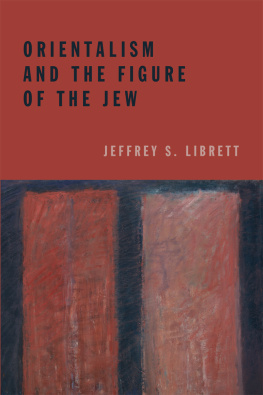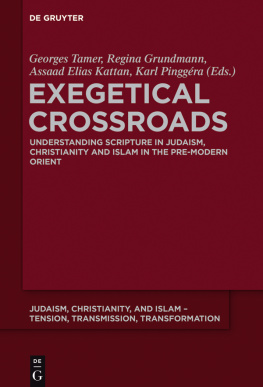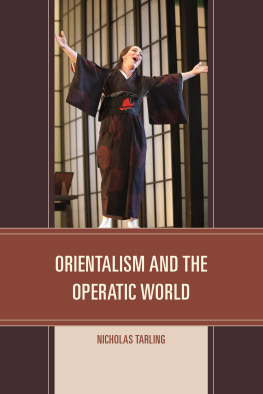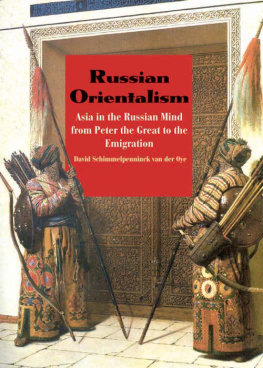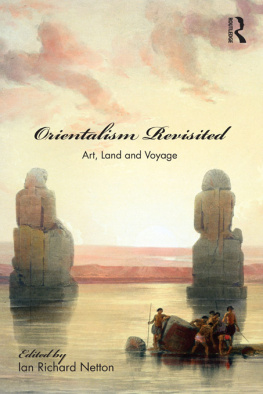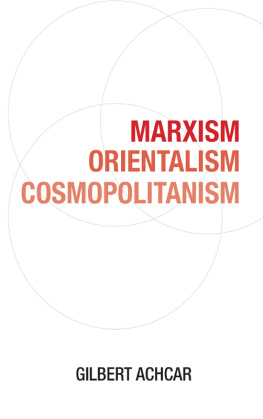ORIENTALISM AND THE FIGURE OF THE JEW
Orientalism and the Figure of the Jew
JEFFREY S. LIBRETT
FORDHAM UNIVERSITY PRESS
New York
2015
Copyright 2015 Fordham University Press
All rights reserved. No part of this publication may be reproduced, stored in a retrieval system, or transmitted in any form or by any meanselectronic, mechanical, photocopy, recording, or any otherexcept for brief quotations in printed reviews, without the prior permission of the publisher.
Fordham University Press has no responsibility for the persistence or accuracy of URLs for external or third-party Internet websites referred to in this publication and does not guarantee that any content on such websites is, or will remain, accurate or appropriate.
Fordham University Press also publishes its books in a variety of electronic formats. Some content that appears in print may not be available in electronic books.
Visit us online at www.fordhampress.com.
Library of Congress Cataloging-in-Publication Data
Librett, Jeffrey S., author.
Orientalism and the figure of the Jew / Jeffrey S. Librett.
pages cm
Includes bibliographical references and index.
ISBN 978-0-8232-6291-5 (hardback) ISBN 978-0-8232-6292-2 (paper)
1. OrientalismGermanyHistory. 2. Orientalism. 3. GermanyIntellectual life. 4. Philosophy, German. 5. JewsPublic opinion. 6. Public opinionGermany. 7. Jews in literature. 8. Orientalism in literature. 9. East and West. I. Title.
DS61.85.L53 2014
303.48'2430509034dc23
2014014999
Printed in the United States of America
17 16 15 5 4 3 2 1
First edition
for Dawn and Malachi and Sasha
The ground of modern German Orientalism is the absence of the ground. This somewhat gnomically provocative formulation of my approach to German Orientalism can be spelled out, still in an extreme condensation, as follows. Around the late eighteenth century, Western modernity finds itself, as if suddenly, without its own absolute foundations, or bereft of grounding, and this not only in the theological dimension but also in the realms of politics, gender, family form, and philosophy generally, to name only the most prominent areas. This lack of foundationswhich implies also a loss of all guidance and measurecreates uncertainty, hence anxiety, and at the limit panic, in those who become aware of it. One fairly pervasive defensive response to this state of affairs among intellectualsduring the period and for many subsequent decadesboth in Germany and in Europe as a whole, is the disavowal of the lacking ground. This is how and why the cognitive and affective uncertainty is often kept in check. And in turn one major modality of this disavowal, I argue, is precisely modern Orientalism (both in its discursive and in its more real, commercial, and colonialist dimensions). Such Orientalism, especially in its historicist articulations, places a fetishized Oriental origin in the place of the lacking absolute foundations, thereby holding nihilism apparently at bay. But the alien origin thus posited must be appropriated in order to become the Wests own. The fetish must become mine.
How does one make ones own an origin one finds radically outside of oneself? In the case of modern Orientalism, the appropriation is accomplishedand this is a main theme of the bookthrough the application of medieval typology, or figura, to the East-West relation. Whereas the Jewish-Christian relation was traditionally conceived as that between the prefigural dead letter and its fulfillment in the living spirit, now the Oriental-Occidental relation in general is conceived along exactly these lines. This is one of the (generally ignored or underappreciated) points I emphasize throughout: One cannot adequately understand the Orientalist problematicespecially but not exclusively in the German traditionwithout exploring in detail its constant entanglement with the problematic of Christian anti-Judaism. The Jew is not only always one particular type of Oriental, but the prefiguration, as it were, of the position of the Oriental in general as a prefiguration of the West. To examine the typological appropriation of the Oriental origin from this point of view enables us to understand the (otherwise baffling) combination of idealization and disparagement that characterizes the Orientalist discourse in general. And it further enables us to formalize the necessity in terms of which the Orient must at every turn be subjected to bifurcation into an appropriable aspect and an abject, inappropriable aspect that must always be made responsible for the otherness of the alien origin. The most prominent case of such a bifurcation in the German tradition (and more generally in Europe) is the opposition between the Semitic Orientwhich must remain utterly foreignand the Aryan Orientwhich functions as the Orient that is essentially and radically our own. The sad logic that underlies the disastrous development of this opposition is one of the things that this book attempts to clarify. The book pursues this argument in close readings of major German-language thinkers and writers from Johann Gottfried Herder to Sigmund Freud. But in order to be able to focus in the individual chapters on close textual readings of these main figures, it is necessary to establish in greater detail my crucial conceptual and historical points of reference. Accordingly, in the introduction I develop elucubrations on the abyssal character of modernity and on Orientalism as a typological disavowal of this vertiginous situation, especially beginning with the panic about pantheism around the philosophy of Baruch, or Benedict, Spinoza.
I have worked on this German Orientalism project off and on for so many years that I will certainly fail to do justice to the several institutions and many people who have supported both me and the project along the way, but here goes.
Parts of this book were written with the help of grants by the Zentrum fr Literaturforschung in Berlin (Summer 2005) and the Oregon Humanities Center (Fall 2005). A Summer Humanities Grant at the University of Oregon (2010) also aided research and writing.
Different parts and aspects of the book have been presented as lectures at Cornell, Duke, the University of Washington, the University of Oregon, the Free University Berlin, Cardozo Law School, New York University, and the University of Central Florida, and at the annual conferences of the German Studies Association conference, the Midwest Modern Language Association, the Modern Language Association, and the Western Humanities Alliance, and I thank all of those who invited me or otherwise enabled me to present these talks, and those who listened and gave me useful critical responses.
Essentially the same text as Preussischer Kulturbesitz for their permission to reproduce the images used throughout the book.
To my friends and colleagues at Groupe interdisciplinaire freudien de recherches et dinterventions cliniques et culturelles (GIFRIC) and at the cole freudienne du Qubec, in Qubec City, I am grateful for their ongoing support and in particular for the opportunities (a) to develop my thinking about Orientalism further in Perversion and Freedom at Abu Ghraib, my contribution to the essay collection Les enjeux de perversion aujourdhui/The Stakes of Perversion Today (Quebec: GIFRIC, 2005); (b) to present in the Clinical Seminar in 2006 a paper on Orientalism and fetishism in The Mummys Foot, by Thophile Gautier; and (c) to present the reading of Moses and Monotheism in the Clinical Seminar in 2009. I thank Tracy McNulty for encouraging me to write a chapter on Moses and Monotheism.
I am forever grateful for the strong support of this project (and of my work in general) shown by Peter U. Hohendahl, whose devotion to German Studies and Comparative Literature as emancipatory enterprises has always provided for me and so many others an admirable standard of integrity and intelligence in the profession of the humanities.
Next page
